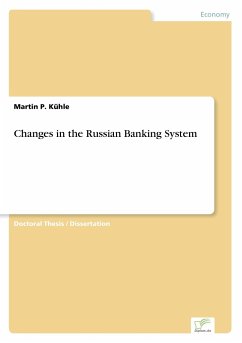Doctoral Thesis / Dissertation from the year 1996 in the subject Business economics - Investment and Finance, University of St Andrews (Unbekannt), language: English, abstract: Inhaltsangabe:Abstract:
This dissertation analyses the structural changes in the Russian banking system and gives insights into the current market situation. Starting with a review of theoretical aspects of banking in Western economies and the rationale for the existence of banks, the deficiencies of the former socialist banking system are exposed. A large section is dedicated to the special role of the banking system during the process of transition and to an evaluation of how far Russian banks rise to the challenges of these tasks. The historical process of reforming the central and commercial banking system is described, laying emphasis on the legislative changes and the means of supervision.
The banking system in Russia has been dominated by rapid growth in the last three years due to high profit expectations. However, many banks granted credits to dubious industrial companies and now face a large amount of uncollectable assets in their credit portfolios. The analysis shows that with rising positive real interest rates and growing competition in the banking market, a large number of small and mediumsized banks will either have to admit bankruptcy or be acquired by expanding banks.
The emerging interbank, bond and equity markets are illustrated with regard to the influence of banks. The deficiencies in settlement processes, liquidity, trading rules, and private and commercial law are examined. The next urgently required steps in the reform process are listed. The future progress of the Russian banking system however, is not only dependent on legal and structural changes in related financial and capital markets, but based on the critical assumption of peaceful, politically stable and socially balanced developments in Russia.
Inhaltsverzeichnis:Table of Contents:
AbstractIV
1.Introduction1
2.Theoretical Aspects of Banking
2.1Theory of Financial Intermidiation3
2.2Thr, Banking System in a Centrally Planned Economy7
2.3The Role of Banks in Russia's Transition to a Market Economy9
3.The Banking Refomis in Russia
3.1Russian Banking Legislation18
3.1.1The Independence of the Central Bank19
3.1.2The Commercial Banking Legislation23
3.2Russian Banking Supervision24
3.2.1The Licensing Process25
3.2.2Creditor Protection and Assessment of Reliability29
3.2.3Accounting and Audit33
4.The Financial Market Situation in Russia
4.1Russian Commercial Banks36
4.1.1The -Former Specialised Banks36
4.1.2The Ministerial Bank38
4.1.3Independent Commercial Banks38
4.1.4Foreign Banks in Russia41
4.2The Capital Market43
4.2.1The Interbank Market43
4.2.2The Bond Market44
4.2.3The Equity Market46
4.2.4The Moscow Forex Market49
4.2.5The Bad Debt Problem49
4.3The Banking Crisis51
4.4The Payment System52
5.Outlook59
6.Appendix
6.1List of Illustrations64
6.2List of Tables64
6.3List of Abbreviations65
6.4Bibliography67
Hinweis: Dieser Artikel kann nur an eine deutsche Lieferadresse ausgeliefert werden.
This dissertation analyses the structural changes in the Russian banking system and gives insights into the current market situation. Starting with a review of theoretical aspects of banking in Western economies and the rationale for the existence of banks, the deficiencies of the former socialist banking system are exposed. A large section is dedicated to the special role of the banking system during the process of transition and to an evaluation of how far Russian banks rise to the challenges of these tasks. The historical process of reforming the central and commercial banking system is described, laying emphasis on the legislative changes and the means of supervision.
The banking system in Russia has been dominated by rapid growth in the last three years due to high profit expectations. However, many banks granted credits to dubious industrial companies and now face a large amount of uncollectable assets in their credit portfolios. The analysis shows that with rising positive real interest rates and growing competition in the banking market, a large number of small and mediumsized banks will either have to admit bankruptcy or be acquired by expanding banks.
The emerging interbank, bond and equity markets are illustrated with regard to the influence of banks. The deficiencies in settlement processes, liquidity, trading rules, and private and commercial law are examined. The next urgently required steps in the reform process are listed. The future progress of the Russian banking system however, is not only dependent on legal and structural changes in related financial and capital markets, but based on the critical assumption of peaceful, politically stable and socially balanced developments in Russia.
Inhaltsverzeichnis:Table of Contents:
AbstractIV
1.Introduction1
2.Theoretical Aspects of Banking
2.1Theory of Financial Intermidiation3
2.2Thr, Banking System in a Centrally Planned Economy7
2.3The Role of Banks in Russia's Transition to a Market Economy9
3.The Banking Refomis in Russia
3.1Russian Banking Legislation18
3.1.1The Independence of the Central Bank19
3.1.2The Commercial Banking Legislation23
3.2Russian Banking Supervision24
3.2.1The Licensing Process25
3.2.2Creditor Protection and Assessment of Reliability29
3.2.3Accounting and Audit33
4.The Financial Market Situation in Russia
4.1Russian Commercial Banks36
4.1.1The -Former Specialised Banks36
4.1.2The Ministerial Bank38
4.1.3Independent Commercial Banks38
4.1.4Foreign Banks in Russia41
4.2The Capital Market43
4.2.1The Interbank Market43
4.2.2The Bond Market44
4.2.3The Equity Market46
4.2.4The Moscow Forex Market49
4.2.5The Bad Debt Problem49
4.3The Banking Crisis51
4.4The Payment System52
5.Outlook59
6.Appendix
6.1List of Illustrations64
6.2List of Tables64
6.3List of Abbreviations65
6.4Bibliography67
Hinweis: Dieser Artikel kann nur an eine deutsche Lieferadresse ausgeliefert werden.








